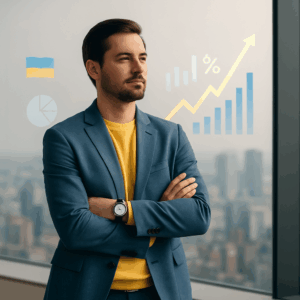What are the best investment options for Ukrainian expats?
Available Ukrainian expat investment options include holding offshore accounts in stable jurisdictions, buying property in your host country, and investing in global index funds.
Participation in Ukraine’s recovery-related opportunities, such as infrastructure projects or agricultural ventures, is also possible for those with a higher risk tolerance.Bottom of Form
For Ukrainians living abroad, investment strategy depends heavily on timing, location, and the ongoing economic and political situation at home.
Some choose to keep assets in Ukraine to maintain property rights or support family, while others prefer to diversify internationally to protect wealth from currency instability, banking restrictions, or regional risks.
My contact details are hello@adamfayed.com and WhatsApp +44-7393-450-837 if you have any questions.
The information in this article is for general guidance only. It does not constitute financial, legal, or tax advice, and is not a recommendation or solicitation to invest. Some facts may have changed since the time of writing.

Investing as a Ukrainian expat
Ukrainian expats often face economic and political uncertainty, so diversification and due diligence are especially important.
For those with a long-term perspective, distressed real estate, farmland, and future reconstruction bonds could become valuable parts of a diversified portfolio once conditions improve.
Tax residency affects how income and gains are taxed, hence it’s important to confirm your status and understand reporting requirements.
Given geopolitical risks, some investors look toward stable currencies and jurisdictions with stronger legal protections.
How to invest as a Ukrainian expat
Start by confirming your Ukrainian tax residency, which influences your tax duties both at home and abroad. Non-residents generally pay tax only on Ukrainian-sourced income.
Consider using offshore investment platforms for diversified, multi-currency portfolios, or local brokerage accounts in your host country for direct access to local assets.
Retaining Ukrainian assets like property or savings plans can make sense if you plan to return, but weigh tax and currency risks carefully.
Is investing in Ukraine a good idea?
Investing in Ukraine offers potential growth, especially in sectors like technology and agriculture, but comes with high political and currency risks.
Many expats hold some local assets for familiarity and potential appreciation but avoid concentrating all wealth there.
A balanced strategy often involves blending Ukrainian investments with offshore assets to mitigate risks while maintaining exposure to home-market opportunities.
If you’re going to be an expat long term, it makes more sense to invest internationally.
What are the best investment options in Ukraine for expats?
The best investment opportunities in Ukraine include sectors poised for recovery and growth, such as infrastructure, agriculture, and technology startups.

However, ongoing conflict and economic volatility mean these investments carry significant risk.
For expats, property in major cities like Kyiv or Lviv might be an option but comes with market and security uncertainties.
Agricultural land is also a noteworthy sector, with Ukraine being a major global grain producer, though foreign ownership restrictions and political factors can affect accessibility.
Many expats prefer to cautiously explore Ukrainian bonds, including government-issued reconstruction bonds aimed at funding rebuilding efforts.
These bonds may provide income streams while supporting national recovery.
- Real Estate: Property investment, particularly in agricultural land and residential developments in stable regions, could offer long-term value, especially as reconstruction efforts progress.
- Agricultural Investments: Ukraine’s vast farmland is a strategic asset. Investing in agriculture-related businesses or funds may benefit from future growth but requires careful due diligence.
- Tech Startups and Innovation: Ukraine’s growing tech sector offers promising opportunities, but startup investments are high risk and best suited for experienced investors.
- Reconstruction Bonds: Emerging government and private bonds tied to rebuilding infrastructure present potential high-yield options, though these carry significant political and credit risks.
- Local Stocks and Bonds: The Ukrainian stock market is volatile and less liquid than more developed markets, so investments here should be approached cautiously.
It’s important to keep up-to-date of regulatory changes and political developments, as these can impact investment conditions.
Best Offshore Investments for Ukrainian Expats
Popular offshore investment options for Ukrainian expats include international ETFs and mutual funds for broad exposure, offshore accounts in financial hubs like Luxembourg for legal and currency advantages, and real estate in Western Europe or North America for income and stability.
Offshore company structures can be used to efficiently manage cross-border assets, although careful compliance with international tax regulations is necessary.
Note: Not all providers accept Ukrainian expats due to geopolitical and compliance reasons, but some specialized providers do. We have access to some of these platforms to help you navigate your options.
- International ETFs and Mutual Funds: These provide access to diversified portfolios across equities, bonds, and sectors worldwide, helping to spread risk beyond Ukraine.
- Offshore Accounts in Stable Jurisdictions: Countries like Luxembourg, Switzerland, and Singapore offer robust legal protections, multi-currency portfolios, and tax efficiency.
- International Real Estate: Investing in properties abroad can offer stable rental income and portfolio diversification.
- Host-Country Investment and Retirement Plans: Many expats benefit from local pension schemes or tax-advantaged accounts in their new country of residence.
Overall, offshore investments can provide Ukrainian expats with access to more stable markets, enhanced legal protections, and diversified currency exposure, all of which are especially valuable amid local uncertainties.
Ukrainian Alternative Investment Options
Alternative investments for Ukrainian expats can offer diversification beyond traditional stocks and bonds but typically carry higher risk and complexity. Popular options include private equity, venture capital, hedge funds, and structured products.
These investments often require larger capital commitments and thorough due diligence.
Given the geopolitical and economic uncertainties surrounding Ukraine, some expats seek alternative assets that may deliver uncorrelated returns or access niche markets not available via public exchanges.
However, such opportunities are generally suitable for experienced investors comfortable with higher volatility and longer investment horizons.
Offshore Company Structures for Ukrainian Expats
Setting up offshore entities can be a strategy for Ukrainian expats to facilitate international business and investments, asset protection, and estate and tax planning
Jurisdictions like the British Virgin Islands or Panama are popular due to favorable corporate laws and confidentiality provisions.
However, it’s crucial to comply fully with international tax laws and reporting requirements, especially given increased global scrutiny.
Proper legal and tax advice is essential to avoid penalties and ensure the structure aligns with the expat’s residency and business targets.
Ukrainian Tax Residency
Ukraine considers you a tax resident if you spend at least 183 days within a calendar year on its territory or if Ukraine remains the center of your personal and economic life. This includes ties such as family, home, or business interests.
Even if you travel often, maintaining close connections to Ukraine may keep you classified as a resident for tax purposes.
Do expats pay tax in Ukraine?
Yes, Ukrainian residents pay tax on their global income, which includes wages, investment profits, and rental income.
If you are considered a non-resident, you will generally only pay tax on income generated inside Ukraine.
Establishing non-resident status typically requires proving that your primary life base and interests have shifted outside the country.
Do Ukrainian expats pay taxes on investments?
Yes, as long as they remain a tax resident of Ukraine, they’ll be taxed on global investments.
Non-resident Ukrainian expats will also be taxed on investments within Ukraine.
Do I need to declare foreign income in Ukraine?
If you are a Ukrainian tax resident, reporting foreign income is mandatory.
Ukraine has increased its compliance efforts to align with international standards, so timely and accurate reporting is critical to avoid fines or investigations.
Ukrainian tax on investments vs host countries
Taxpayers living abroad face the risk of paying tax twice on the same income, once in Ukraine and again in their country of residence.
Ukraine has double taxation agreements with many countries to trim or eliminate this burden, but navigating these treaties requires careful planning and knowledge of both tax systems.
What happens to my investments if I leave Ukraine?
Leaving Ukraine doesn’t automatically affect ownership of your investments, but your tax and reporting obligations will likely change depending on your new residency status.
Again, if you become a non-resident, you generally won’t pay Ukrainian tax on income earned outside Ukraine.
However, you will still be liable for Ukrainian tax on any income sourced within the country, such as rental income from Ukrainian property or dividends from Ukrainian companies.
It’s important to notify Ukrainian tax authorities about your move and clarify your residency status to avoid unexpected tax liabilities or penalties.
FAQs
Is it a good idea to invest in Ukraine?
Ukraine offers significant opportunities, especially in sectors like agriculture, infrastructure, energy, and technology, due to its vast natural resources and strategic location.
However, investing in Ukraine carries risks related to political instability, ongoing conflict in certain regions, regulatory challenges, and economic volatility.
Thorough due diligence and risk assessment are essential before investing.
Can a foreigner open a bank account in Ukraine?
Yes, foreigners can open bank accounts in Ukraine. The process typically requires valid identification (passport), proof of address, and sometimes additional documents depending on the bank.
Some banks offer services tailored to foreigners, including multi-currency accounts.
It’s advisable to check specific bank requirements and consider the political and economic environment.
Does Ukraine tax foreign income?
Ukraine taxes residents on their worldwide income, including foreign income. Non-residents are generally taxed only on Ukrainian-sourced income.
Residency is usually determined by spending more than 183 days in Ukraine in a calendar year or having a permanent residence there.
Is there capital gains tax in Ukraine?
That depends on the assets being sold. Profits from selling assets like forex or other capital assets are generally not taxed in Ukraine.
However, if you receive income from investments like dividends, interest, and rent, that income is levied usually at 18% personal income tax plus a 1.5% military tax.
That said, tax laws can be complex, and some asset sales might be treated differently depending on the asset type and circumstances, so it’s always best to consult a tax expert for your specific situation.
Pained by financial indecision?

Adam is an internationally recognised author on financial matters with over 830million answer views on Quora, a widely sold book on Amazon, and a contributor on Forbes.



